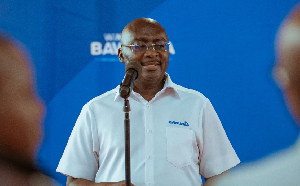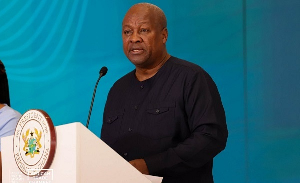Ghana is experiencing a strange, interesting and state-of-the-art politics where a government or political party gains popularity when it takes the risk of reducing the prices of petrol. This development in the country clearly manifest the fact that Ghana is not serious in her efforts at causing a change and overhauling the present state of the economy to one that is capable of reducing the threat and high impact of poverty on people, especially those in the rural communities. The way and manner in which petrol is being politicized have created the impression that it is a myth when saying Ghana will develop. The politics of petrol has gained ground and for that matter needs to be redressed if the country really wants to experience sustainable human development. This shift of concentration from salient development issues to trivial issues is capable of plunging the country into disaster in terms of development.
It was all competition during the campaign promises of the New Patriotic Party (NPP) and the National Democratic Congress (NDC) during the 2008 General Elections concerning their strategies to bring down the prices of petrol to the bearest minimum when voted into power. As if to say that, Ghana is the largest producer of petroleum in the world and that we can control the prices of petrol as we wish. It is an undisputable fact that, the ability of a country to manage her petroleum products is essential to economic growth and development but the way and manner it is being done is highly unacceptable and uncalled for. Petrol issues was the hottest campaign subject been preached by the political parties during the elections all in attempts at canvassing for votes to gain power and every Ghanaian was yearning to hear as it is indispensable commodity in life. It is worthy of note that, neither the Government of Ghana or a political party control the global prices of petrol and as such cannot promise of petrol price reduction for the benefit of the ordinary Ghanaian without prior economic analysis. This issue in question has gained the limelight in news headlines in the country and received blatant criticisms when the National Democratic Congress gained power simply because of their promise during the campaign trail in the country to reduce petrol price when voted into power. The paradigm now is ‘reduce the price of petrol without regarding the economic side-effect and be popular’. This is politics made in Ghana. We should ask ourselves, Are we serious as a country?
It is hard time and crucial for
our development that such issues needed not be politicized. Very pressing and salient issues need to be taken into consideration to address this ailing economy which has rendered life almost unbearable for the ordinary Ghanaian. Can Ghana emulate the efforts of and patterns of Malaysia in her quest to ensure sustainable development with this type of political system? The politics of petrol is absolutely an insult to the intelligence of the people simply because our politicians are taking advantage of the high illiteracy among the people to satisfy their selfish ambition. If this type of politics is so intense when Ghana is not yet a petroleum producing country, what then would be the situation and fate of this country when petroleum production commences in somewhere 2010? Petrol has been the present day uncanny means of canvassing for votes and satisfying and propitiating the people for their votes. This is a dangerous path and development for this country since it can render all development efforts in terms of policies and programmes futile. It is indeed wise and acceptable to ask the government and the people of Ghana ‘What manner of development is this?’
It is sad to point out that, Ghana has been slothful in her pace and efforts towards development by reason of the fact that the country has not been able to adopt long-term policy document that can drive us forward in the needed change and using the plan regardless of the political party in power. These are such issues that need to be given attention and be made known to the public through the media since it is capable of engineering the country to higher heights. Short plans adopted by various governments is not enough to bolster the vision of this country but the only prudent strategy is for a particular government to adopt a medium term or long-term plan that can direct our path and ensure consistency in policies and programmes of development. The change of policies because of change of political party has placed the affairs of the country into a state of the sea waves where the wind is tossing it where it wishes. The formulated medium term or long-term plan would make it binding for every government that comes to power. This has been the secret of Malaysia when Tun Dr. Mahathir bin Mohamad adopted a medium-term plan (known as the various "Malaysia Plans") which engineered the country to the development objectives he set without regarding the international pressures and directions from donor agencies he deemed not relevant to the Malaysia’s growth.
This is a bold step that can ensure that our objectives and goals are achieved and Ghana can move from a developing country to a middle income country. We need politics of strategies to development and not the politics of petrol which is on the ascendancy. This is not benefiting the country in any way but redressing the high incidence of poverty in our rural areas where pupil have to walk from one community to another to assess education. Basic facilities to make life enjoyable are unavailable. The country really has a long way to go if it is unable to provide basic facilities to enhance livelihoods of the majority rural poor. In conclusion, it indeed serves no practical purpose and good for Ghana if we are to concentrate on less important issues to the neglect of salient and burning issues that have the propensity to cause development. This politics will continue so far as petrol remains an important commodity in the world market subjected to price changes and for that matter there should be an urgent solution to this dilemma. Ghana as a country does not have the right attitude to development. All the same, it is never a myth to say that Ghana
will develop. Long live Ghana
By: Stephen Yeboah, Department
of Planning- Kwame Nkrumah University of Science and Technology, Kumasi- Ghana. Email: stephenyeboah110@yahoo.com
Opinions of Wednesday, 22 April 2009
Columnist: Yeboah, Stephen














